Why did Fasting Double my Testosterone? (Patreon)
Content
I just released a video on my channel titled I Fasted for 5 Days and Walked 7 Hours a Day. There I talked about how the benefits of exercise, cold exposure and fasting synergize. I got my blood tested around 1PM on the first day shortly after I finished my last meal and I got it tested again 120 hours later again at 1PM after 5 days of fasting. Here were my blood results before and after:
<figure> </figure>
</figure>LDL Cholesterol 125 mg/dl ⇨ 101mg/dl
HDL Cholesterol 40mg/dl ⇨ 43mg/dl
Triglyceride 56mg/dl⇨ 39mg/dl
Insulin 4.5 mcu/ml ⇨ 1.5 mcu/ml
White Blood Cells 6720 ⇨ 4060
CRP 0.25mg/dl ⇨ 0.14mg/dl
IGF-1 194ng/ml ⇨ 111ng/ml
All in all, this was a quite good result. Per this paper, a reduction in White Blood Cells may indicate that more autophagy was going on. CRP reduction indicates less inflammation and as explained in the video, a reduction in IGF-1 should have a longevity benefit. However some may argue that if you’re aiming to build muscle, you want to have more IGF-1. (We’ll address that later)
What I didn’t mention is that I got my testosterone checked at the start of the fast. A couple months earlier it was 802.1ng/dl, but when I got it checked at the start of this fast it was 421.5ng/dl. This was still in the normal range and my libido, strength, mood et cetera were all doing just fine so I wasn’t too worried …but also not happy that it’s lower than before. It’s hard to say if it was due to the fasting or just that I was so busy walking the whole day that I didn’t have much time to think about sex, but I didn’t have much libido during the fast. I was expecting the multiple day fast to drop my testosterone, so I was surprised when I got the result on the last day of fasting before eating my meal: 424.8ng/dl. Basically no change.
Testosterone 421.5ng/dl ⇨ 424.8ng/dl
<figure> </figure>
</figure>I also got my blood checked six days after I started eating normally again. To keep the time consistent, I got all three blood tests at 1PM. This is where things got really interesting.
<figure> </figure>
</figure>My testosterone was now 887.1ng/dl, more than double what it was. I was just 37 points away from being above the reference range.
Actually, I was aware of this phenomenon before I got these results. While doing research for my video What happens if you Don’t Eat for 44 Days? 11 months ago, I came across this 1980 paper titled Reproductive Function during Fasting in Men where they had men fast for 10 days and then refeed for 5 days.
<figure>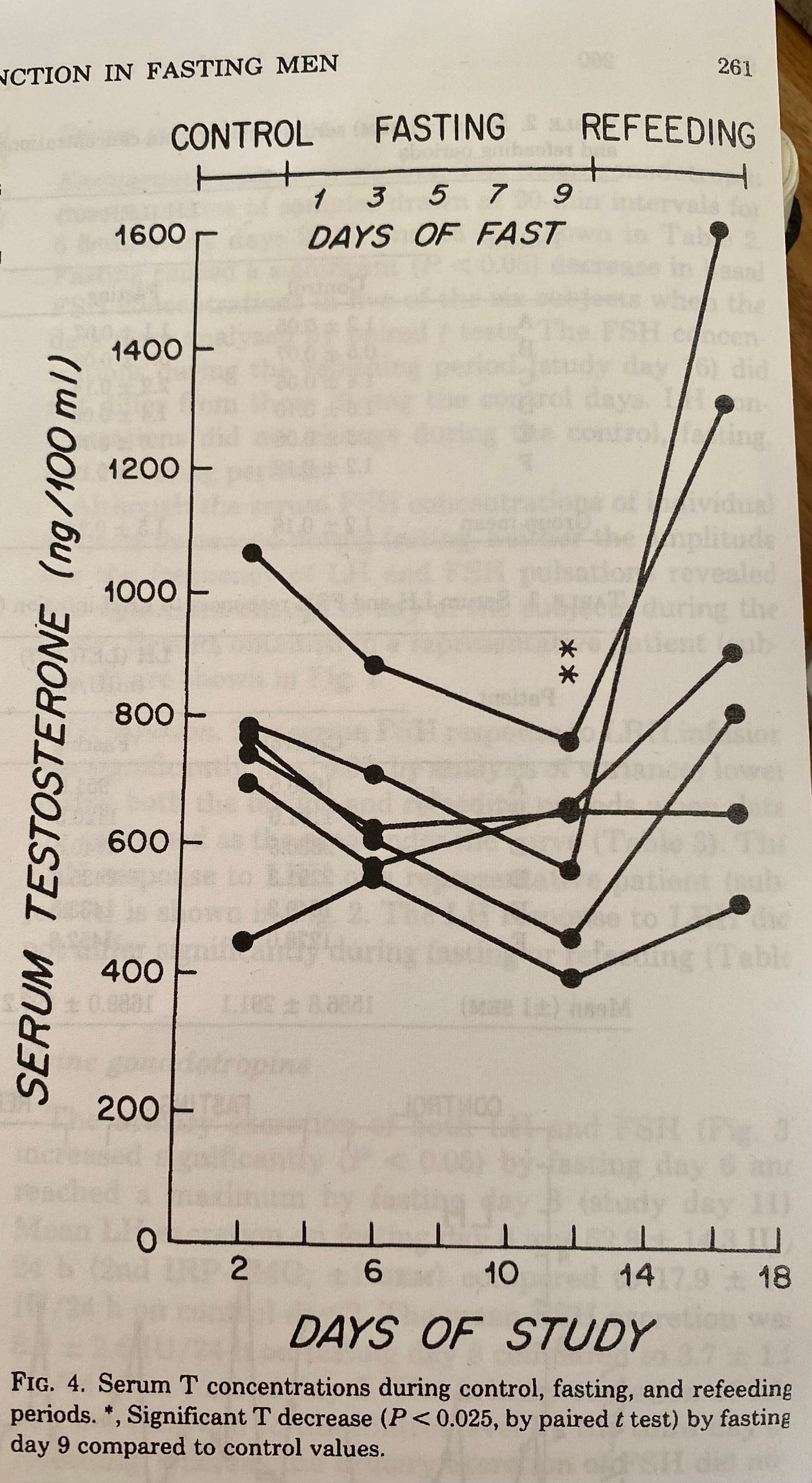 </figure>
</figure>As you can see, 4 of the men experienced a steady decline in testosterone over the fast, but then their testosterone shot up above baseline after refeeding. One man doubled his testosterone from 800ng/dl to 1600ng/dl.
So what the hell is going on?
I actually left this study out of that video because I couldn’t find other studies replicating the effect and there were only 6 men participating in this study. But the fact is there’s not all that much research on fasting and refeeding, which (depending on your goals) is arguably the most important part of the fast.
<figure> </figure>
</figure>To get all the fasting benefits, you have to eat
A study Valter Longo participated shows that while organ weight reduces in the kidneys, heart, and liver during a fast, the organs basically regenerate themselves upon refeeding.
<figure>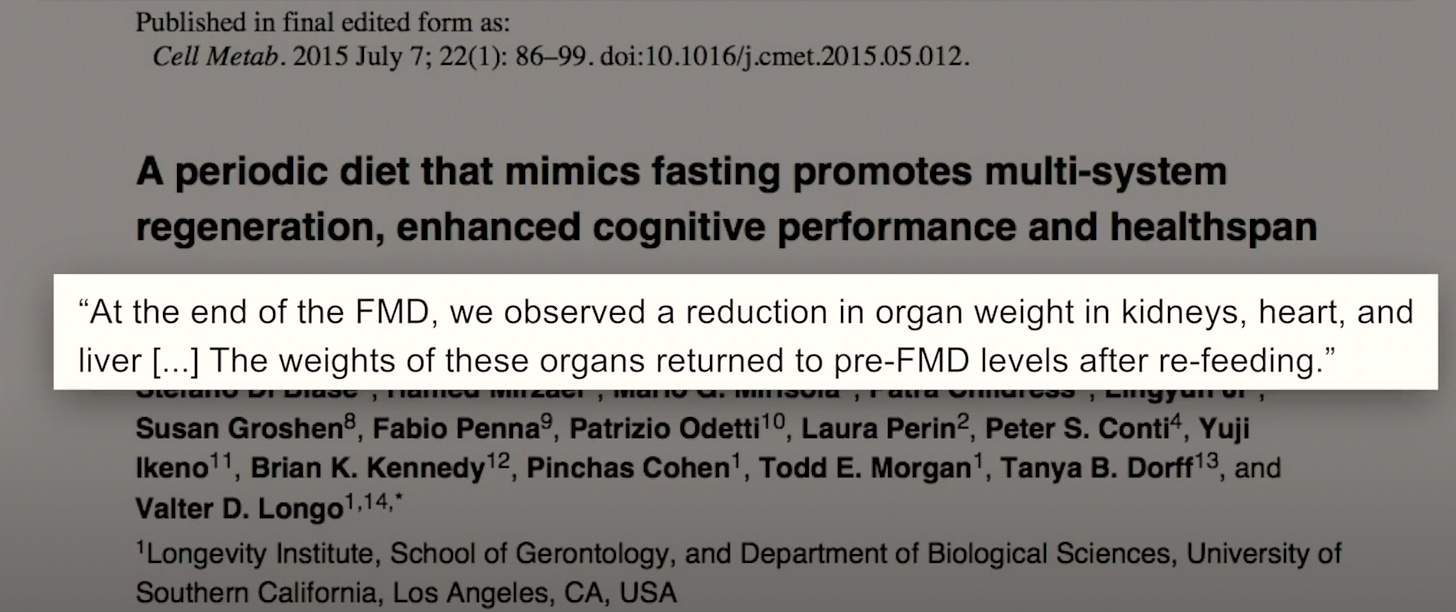 </figure>
</figure>Intestinal stem cells are responsible for maintaining the lining of the intestine, which renews itself about every five days. One study on mice found that a 24 hour fast doubled the regenerative capacity of these stem cells.
<figure> </figure>
</figure>It’s also mentioned in this episode with him on Rhonda Patrick’s podcast that the refeeding phase is very important for stem cell proliferation. So, as discussed in my recent 5 day fast video, there is a tradeoff between growth and longevity - IGF-1 (Insulin-like Growth Factor 1) is a growth factor that encourages the growth of muscle, new brain cells, heals wounds et cetera. These are all generally good things. But for some reason, when you reduce this IGF-1, organisms like mice, worms and flies live much longer.
Longo explains that lowering IGF-1 kills damaged cells and “turns on” stem cells. However, by increasing IGF-1 by eating enough protein after breaking your fast, you promote stem cells to proliferate - to replicate and multiply themselves, stimulating the growth of other specific types of cells.
The generation of healthy cells is IGF-1 dependent… there is no doubt that when you refeed, you have to have sufficient protein to rebuild. And if you don’t, I mean you really don’t have the bricks to rebuild whatever system you partially broke down.<figure>
-Valter Longo
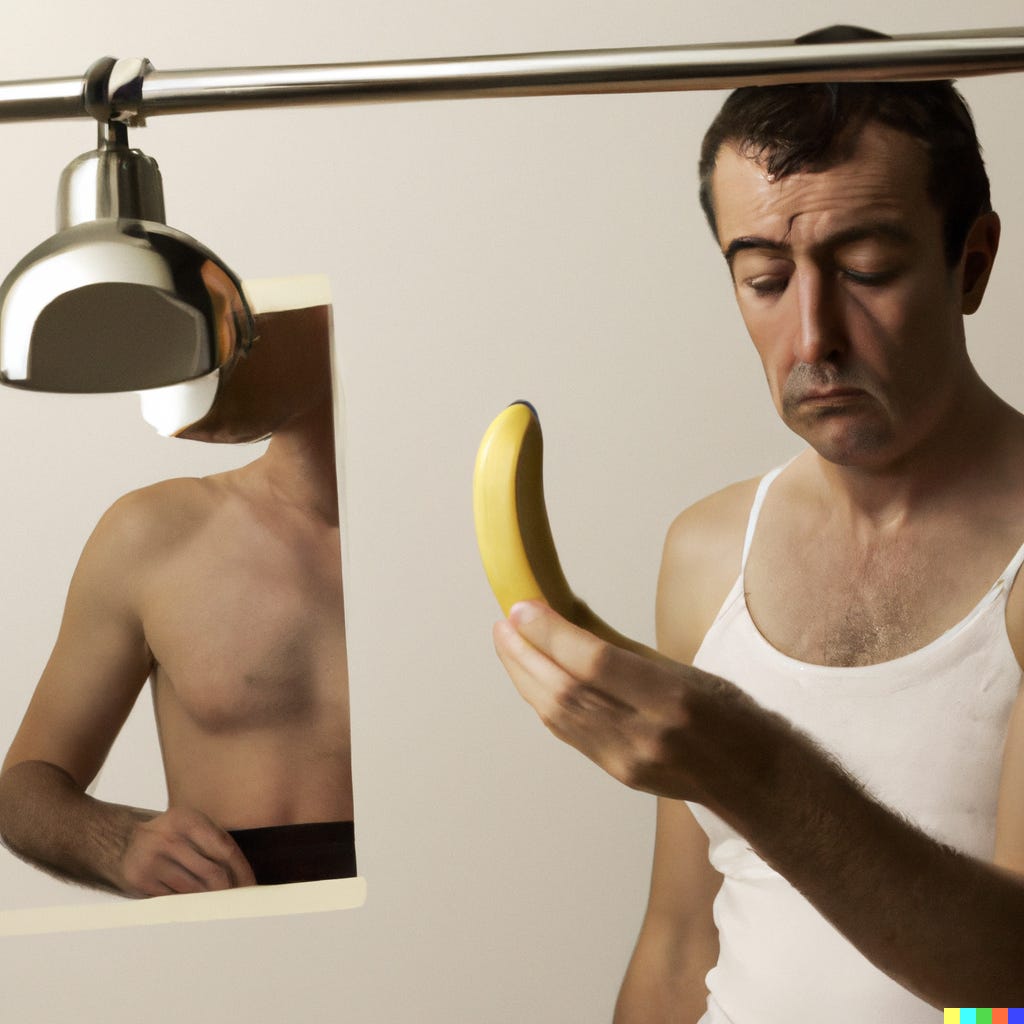 </figure>
</figure>So what happens with testosterone?
This can be pretty confusing because if you look at studies that only look at fasting but not refeeding, you would assume that fasting is quite bad for testosterone. As you saw in the earlier study, testosterone lowered while the men were fasting. You’ll also find studies presenting negative effects on sperm count from prolonged fasting.
<figure>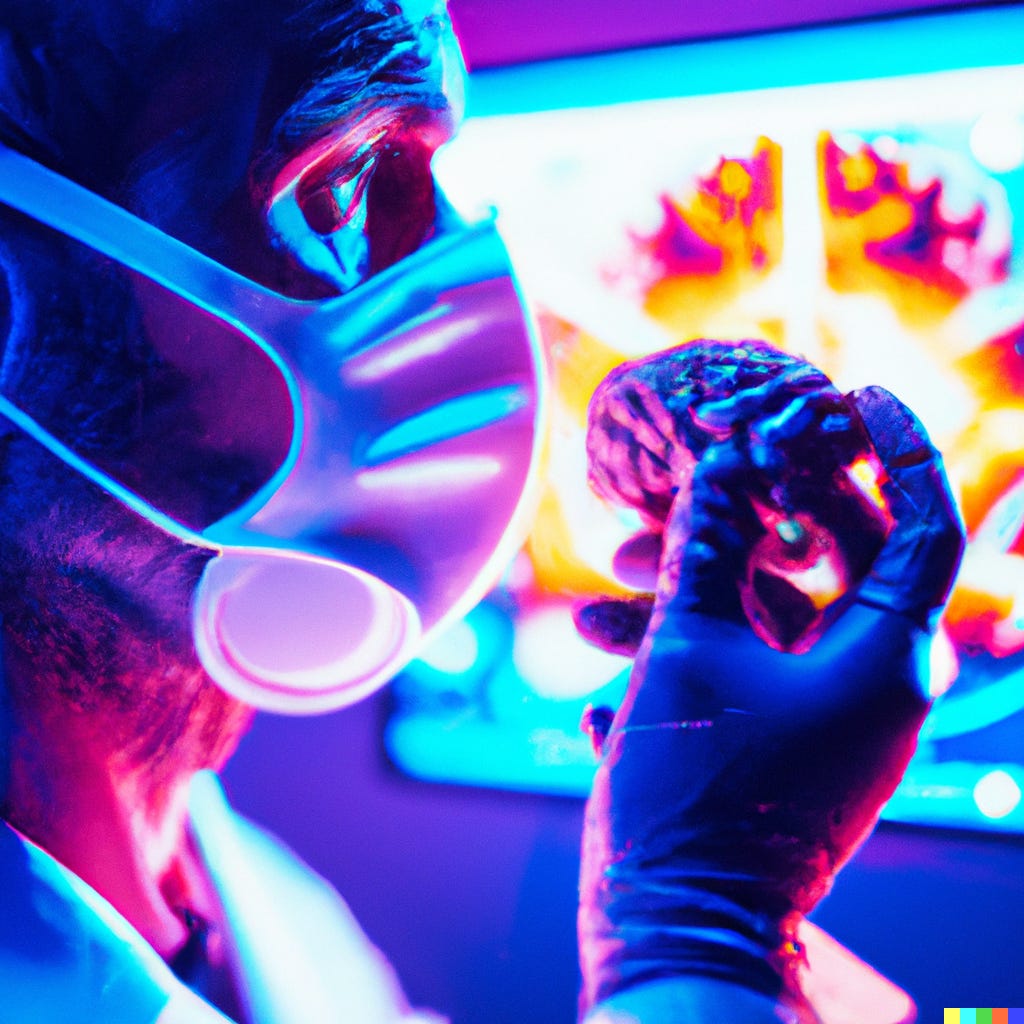 </figure>
</figure>A study titled Influence of Short-Term Fasting on the Pituitary-Testicular Axis in Normal Men found that a 56-hour fast lowered basal serum testosterone from 8.7±0.7 to 5.7±0.8μg/l. Luteinizing hormone which stimulates the testes to make testosterone was also found to drop from 6.9±0.8 to 5.0±0.7 U/l. More evidence fasting isn’t good for testosterone.
<figure>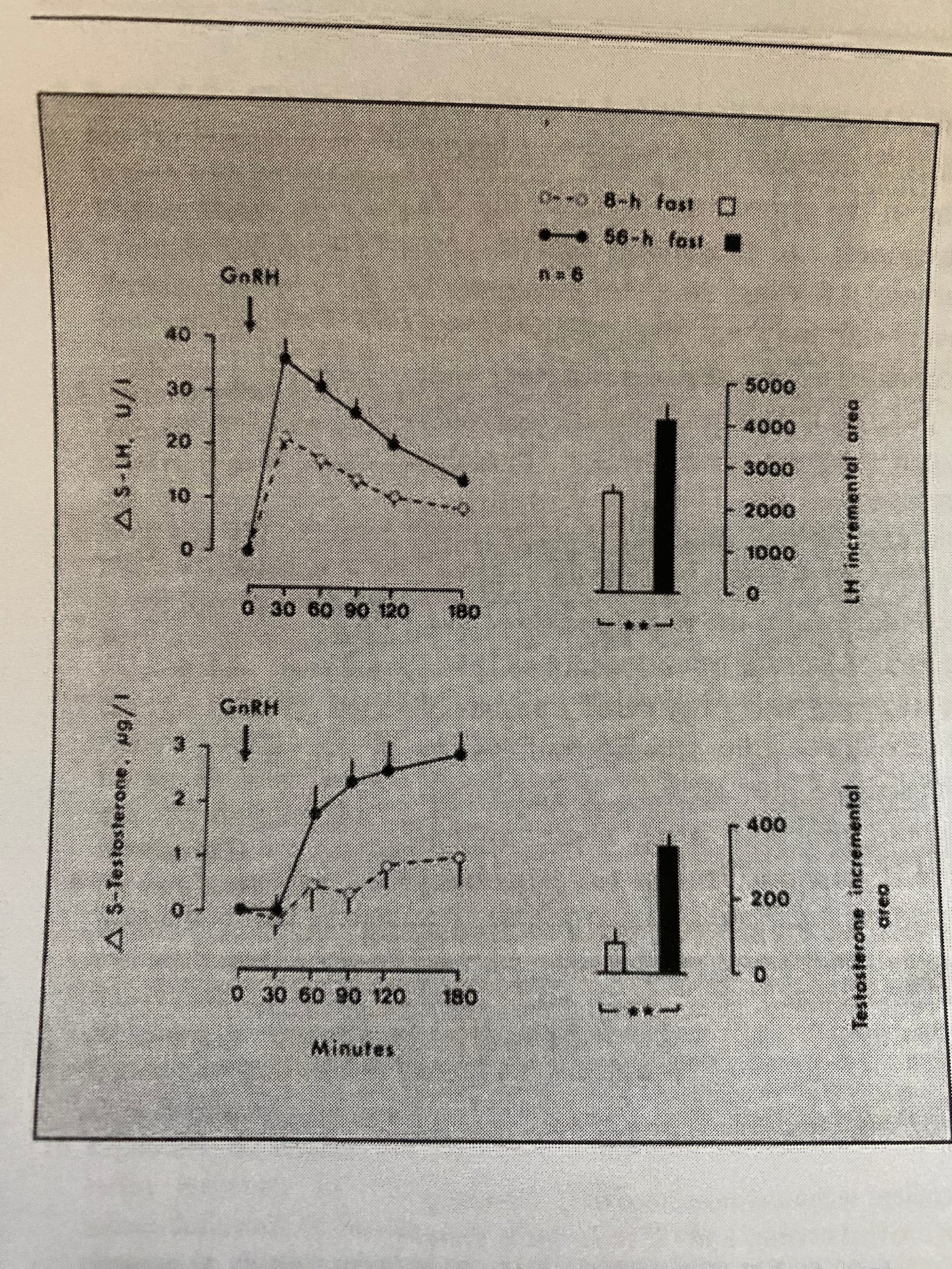 </figure>
</figure>Where this gets interesting is what happens when you inject the people with gonadotropin-releasing hormone (GnRH). GnRH is responsible for causing the release of luteinizing hormone (LH) from the anterior pituitary gland. Luteinizing hormone signals the testes to secrete testosterone.
<figure>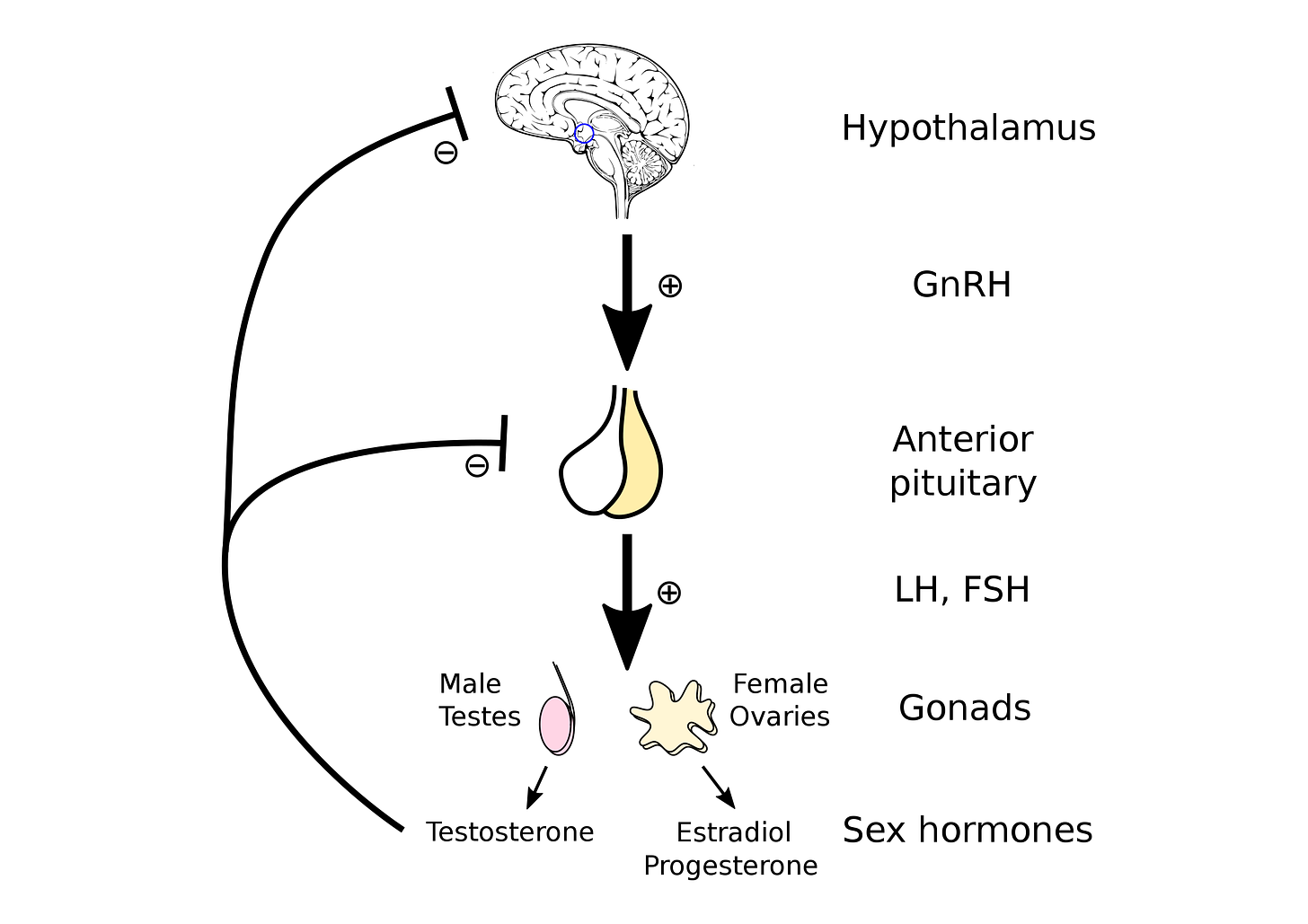 </figure>
</figure>Understandably, when injected with GnRH, you see a huge rise in luteinizing hormone and a rise in testosterone, but this rise was much larger when people fasted for 56 hours, rather than 8 hours. Another study found similar results: GnRH elicited a much greater testosterone and LH release after a 56 hour fast compared to before fasting. A third study titled Increased gonadotropin responsiveness of gonadotropin-releasing hormone during fasting in normal subjects also discusses this phenomenon. In other words, the body seems to be much more sensitive to the effects of GnRH when fasting.
<figure> </figure>
</figure>That’s great and all, but who’s going to do a 56 hour fast and then inject some GnRH they have laying around the house? Well, there is multiple pieces of evidence from in vitro and animal studies that IGF-1 stimulates the release of GnRH and has an effect on the spatial organization of GnRH neurons. Another review on animals shows “how IGF-1 acts directly on GnRH neurons affecting its synthesis and secretion.” Further, another paper titled IGF-1 Influences GnRH Regulation of Puberty lays out how IGF-1 is becoming a prime candidate for playing an important role in the onset of puberty as it induces the release of GnRH.
<figure>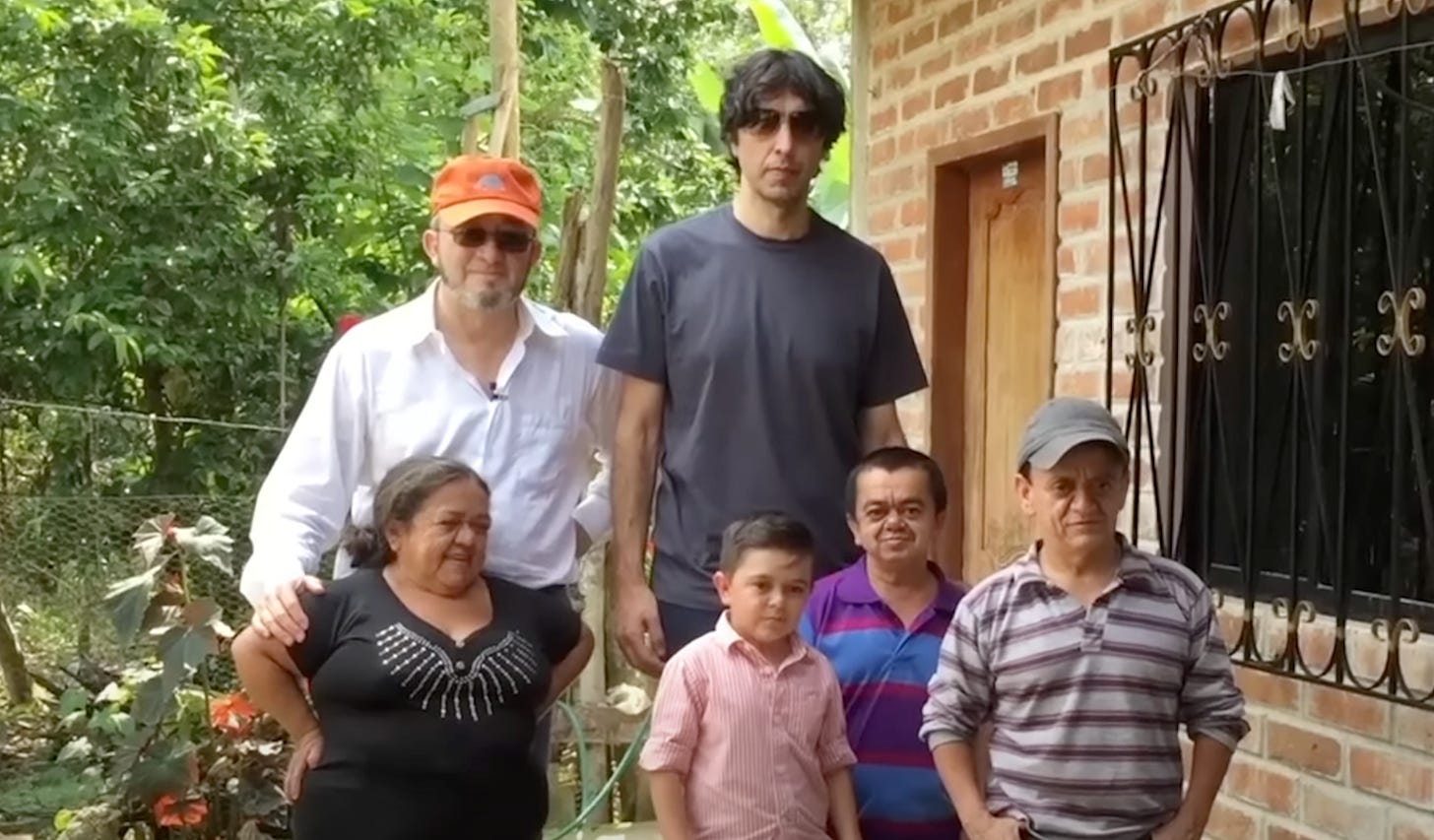 </figure>
</figure>Interestingly, people who have a genetic disease known as Laron Syndrome or primary IGF-1 deficiency experience delayed puberty as well as short stature. However, as Valter Longo has pointed out in his book and several presentations, these people are unusually protected by diseases of aging like cancer and diabetes. (Remember how the reduction of growth factors had certain organisms live much longer?)
So the reason why this is relevant because after refeeding, your IGF-1 should go back up a bit, as did mine. (Somatedin C is the name they use for IGF-1 in Japan)
<figure> </figure>
</figure>My IGF went from 194ng/ml ⇨ 111ng/ml over the fast, then back up to 177ng/ml after eating again.
<figure>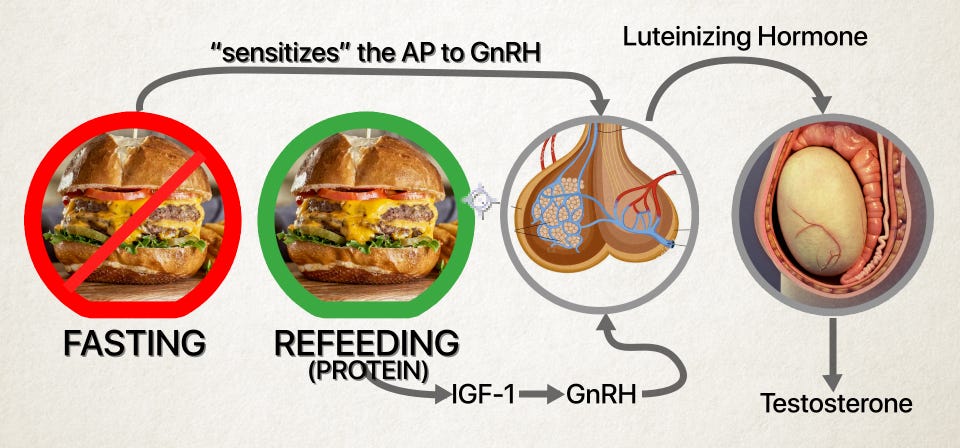 </figure>
</figure>So this is the idea:
(1) Fasting sensitizes the body to GnR
(2) While fasting decreases IGF-1, refeeding increases it
(3) IGF-1 stimulates the release of GnRH*
(4) Levels of LH and testosterone raise more than normal due to the enhanced GnRH effect
*Let me note that this specific sequence of IGF-1 stimulating GnRH release in humans events isn’t firmly established in published research and while it’s understood that refeeding will rapidly restore testosterone to baseline levels, it’s not established that fasting and then refeeding will consistently raise testosterone over baseline.
<figure> </figure>
</figure>A 1991 study titled Restoration of Pulsatile Luteinizing Hormone Secretion after Fasting in Rhesus Monkeys: Dependence on Size of the Refeed Meal found that the more you fed a monkey after the fast, the bigger the LH pulse and the greater the raise in testosterone.
<figure>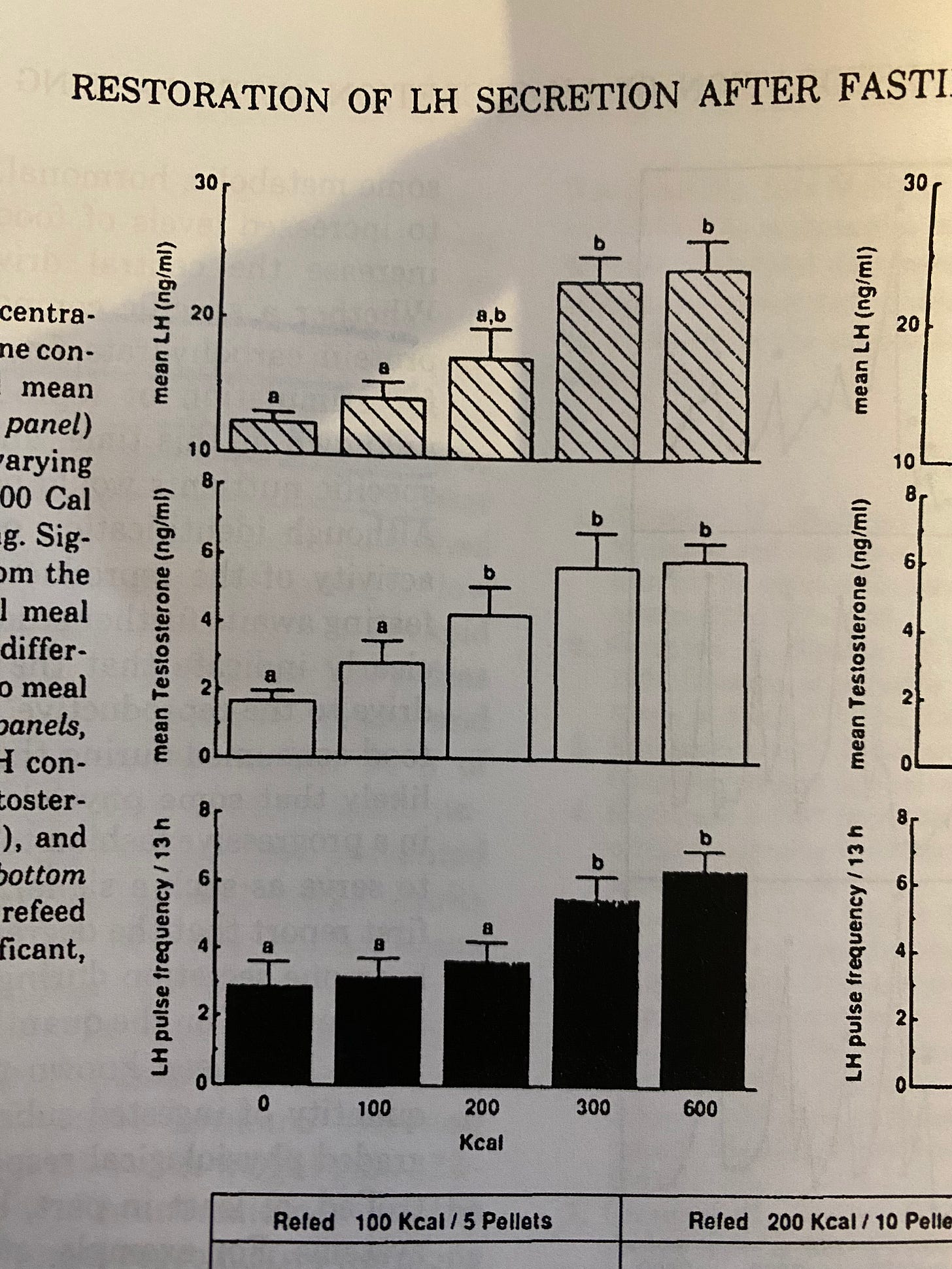 </figure>
</figure>In fact, they found that you got much higher pulses of LH (Luteinizing hormone - the hormone that triggers the testes to secrete testosterone) on a refeeding day compared to a normal eating day.
<figure>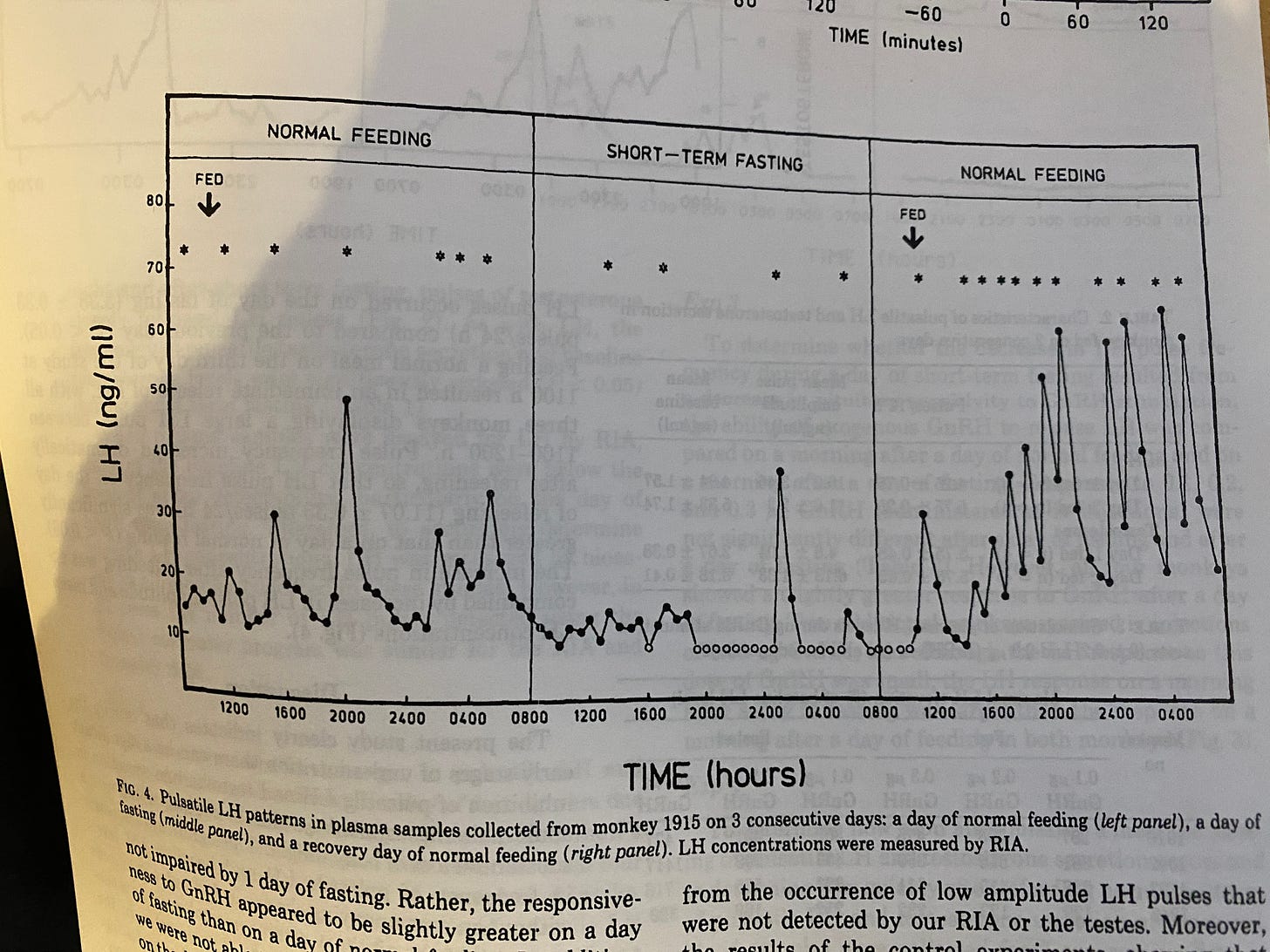 </figure>
</figure>They also noted a sensitizing to GnRH in the monkeys similar to what we discussed above.
…the responsiveness to GnRH appeared to be slightly greater on a day of fasting that on a day of normal feeding.
The study also remarked that while they observed that the bigger the meal, the greater the increase in LH and testosterone, they weren’t sure which macro - carbohydrate, fat or protein was responsible. Based on everything above, I’d wager it was the protein.
On the other hand, there may be other ways fasting helps raise testosterone.
What else could have caused the testosterone rise?
Unsurprisingly, a diabetes and obesity promoting lifestyle seems to lower testosterone. This study found that the more insulin sensitive people are, the higher their testosterone. (Insulin to simplify a bit, if someone is insulin resistant, they usually have a history of constantly having too much insulin in their blood stream from eating too much carbohydrate.) In fact, several studies have suggested low testosterone predicts the development of diabetes.(1,2,3,4,5,6) Long story short, diabetes, a disease characterized by dysfunctional insulin, goes hand in hand with low testosterone. Further, this study found that as insulin increased over time, testosterone dropped
Total plasma testosterone decreased with each decade of age and insulin increased with each decade of age.
Though, considering my insulin was already starting at only 4.5mcu/ml before the fast, it wasn’t like I rose my testosterone by clearing up
<figure>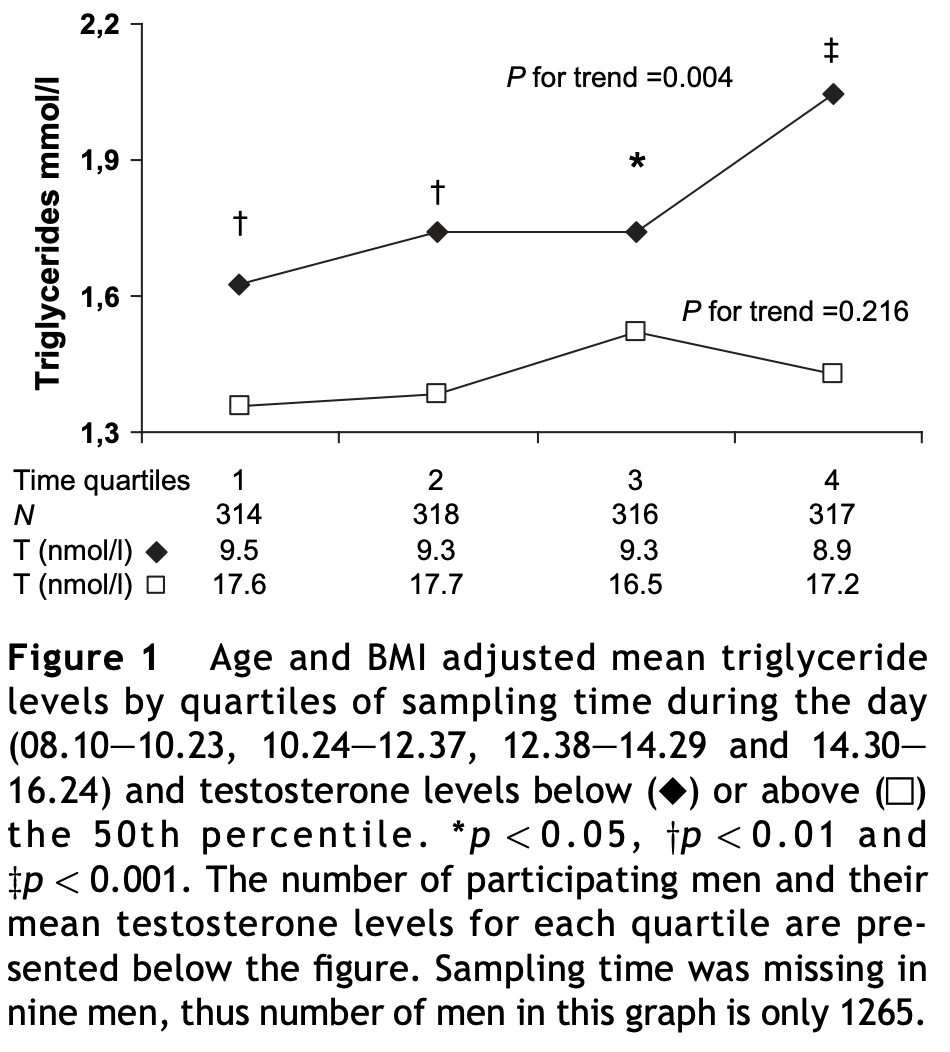 </figure>
</figure>In line with people with metabolic syndrome having worse testosterone levels, this study found that higher triglycerides were associated with lower testosterone (see graph above). My triglycerides did decrease from 56 to 39mg/dl, but 56 is already quite low.
There’s unfortunately not as much research on the specific benefits that refeeding after a fast provides compared to the beneficial physiological changes that occur during a fast. There are still lots of questions like: Can you expect a testosterone rise after eating after just a 1 day fast? A 3 day fast? Will testosterone raise more if you eat 100 grams of protein rather than 50 grams? And so on…
How should you break a fast for maximum benefit?
Well, based on what we talked about above, I would go with a reasonable amount of protein.
I broke my recent 5 day fast with a big ribeye which is roughly equal parts protein and fat for about 1000 calories. To be honest, this is probably too much food at once to break a food with for most people. Since I’ve done tons of fasts, I’m pretty comfortable with eating something like this. However, I will say it was a bit too much fat right off the bat. I felt this familiar queasy feeling I’ve gotten in the past from eating a ton of fat at once. This steak wasn’t that much fat for me, but my stomach felt sensitive in that respect. Probably has something to do with my bile not “working” as well since I had been fasting and not having to digest any fat. This said, it was just a bit of short-lived queasiness - I didn’t vomit and wasn’t feeling ill.
<figure>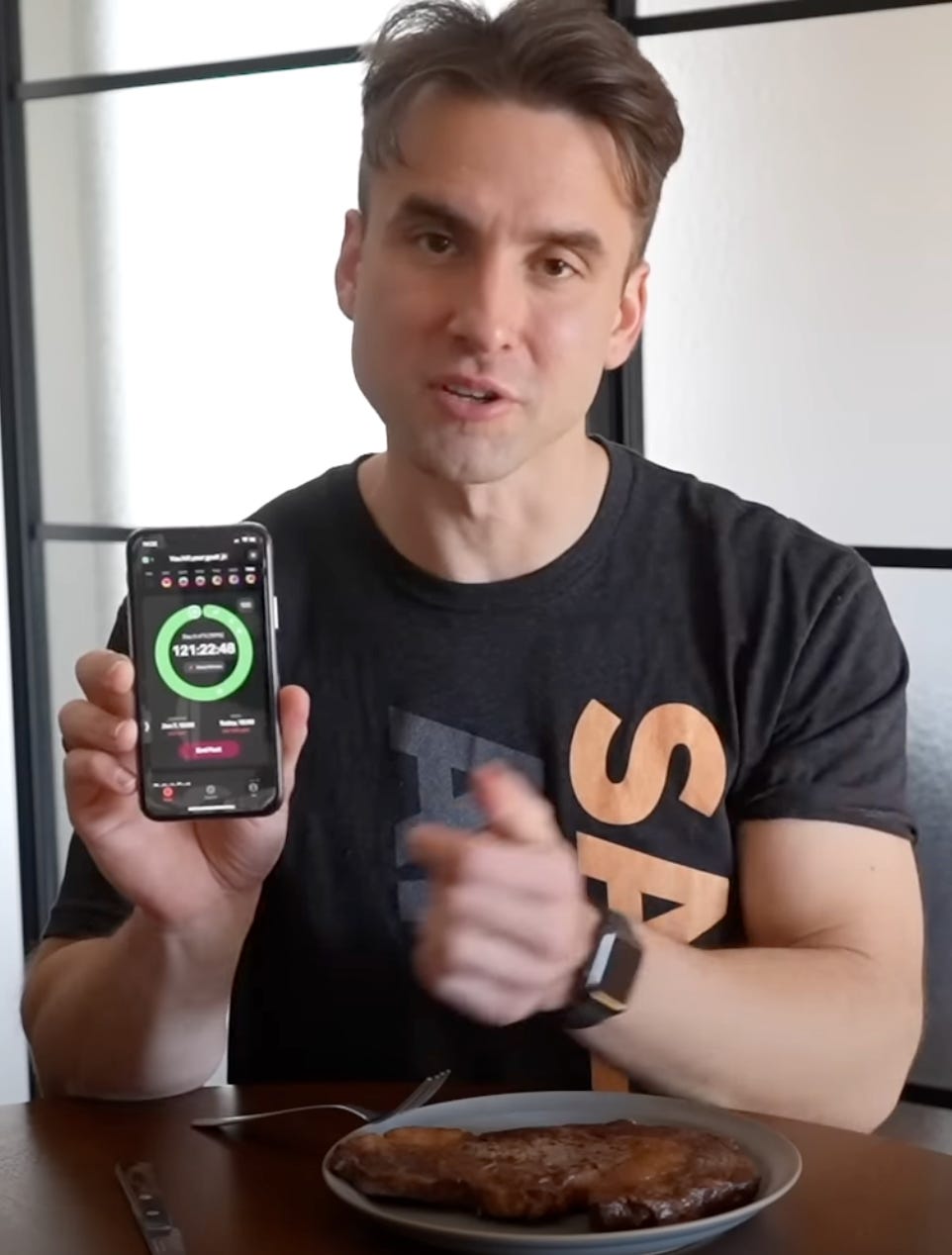 </figure>
</figure>How NOT to break a fast
<figure>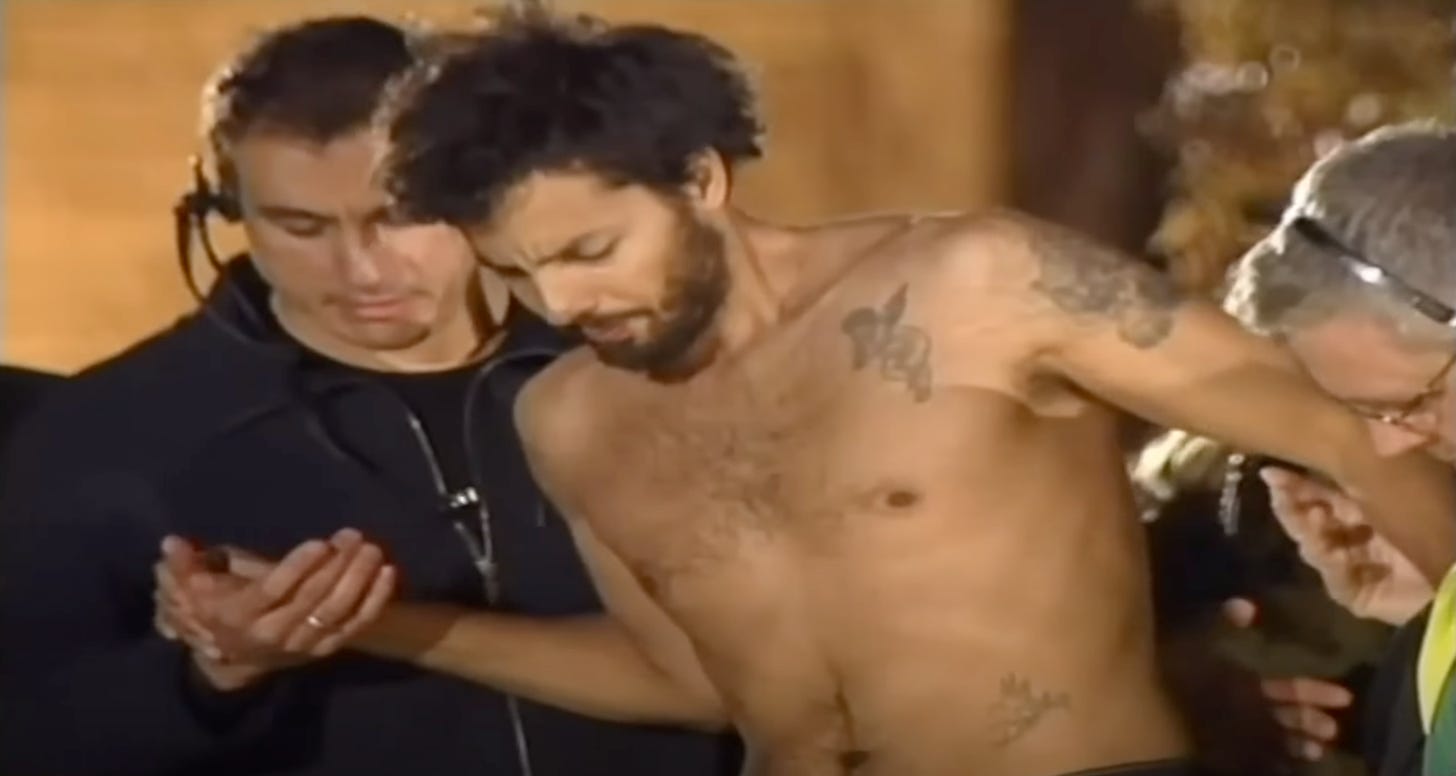 </figure>
</figure>One thing is for sure: You shouldn’t have what David Blaine was given after his 44-day fast. After he was escorted away from his box by ambulance, his refeeding started with Ensure Plus - one of the last things I would want to consume, whether I’m fasting or not. Ensure is basically a fake milkshake made with seed oils instead of cream with a multivitamin tossed in. Here are the first ingredients: Water, Corn Maltodextrin, Sugar, Milk Protein Concentrate, Blend of Vegetable Oils (Canola, Corn). If you’re not aware of why I find the idea of drinking vegetable oils totally nauseating, check out this video on why “heart healthy” vegetable oils are actually toxic.
Ironically, the authors of the clinical report on David Blaine themselves explain why a sugary oilshake after a fast is an awful idea:
…the management of starvation and diabetic ketoacidosis has one striking similarity- the sudden shift of a low insulin, fat-burning metabolism to a high insulin, glucose-based state. The potentially fatal clinical syndrome associated with the treatment of malnutrition has been called the refeeding syndrome.<figure>
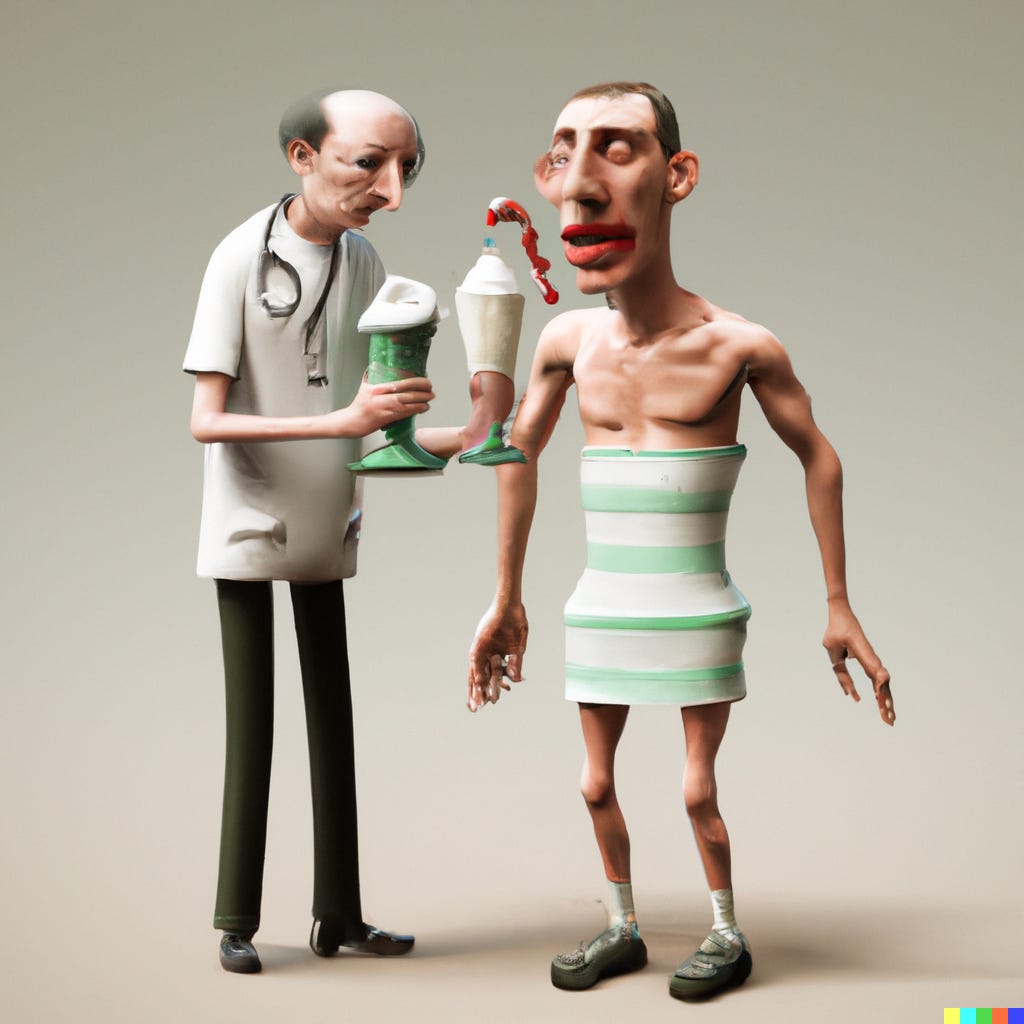 </figure><figure>
</figure><figure>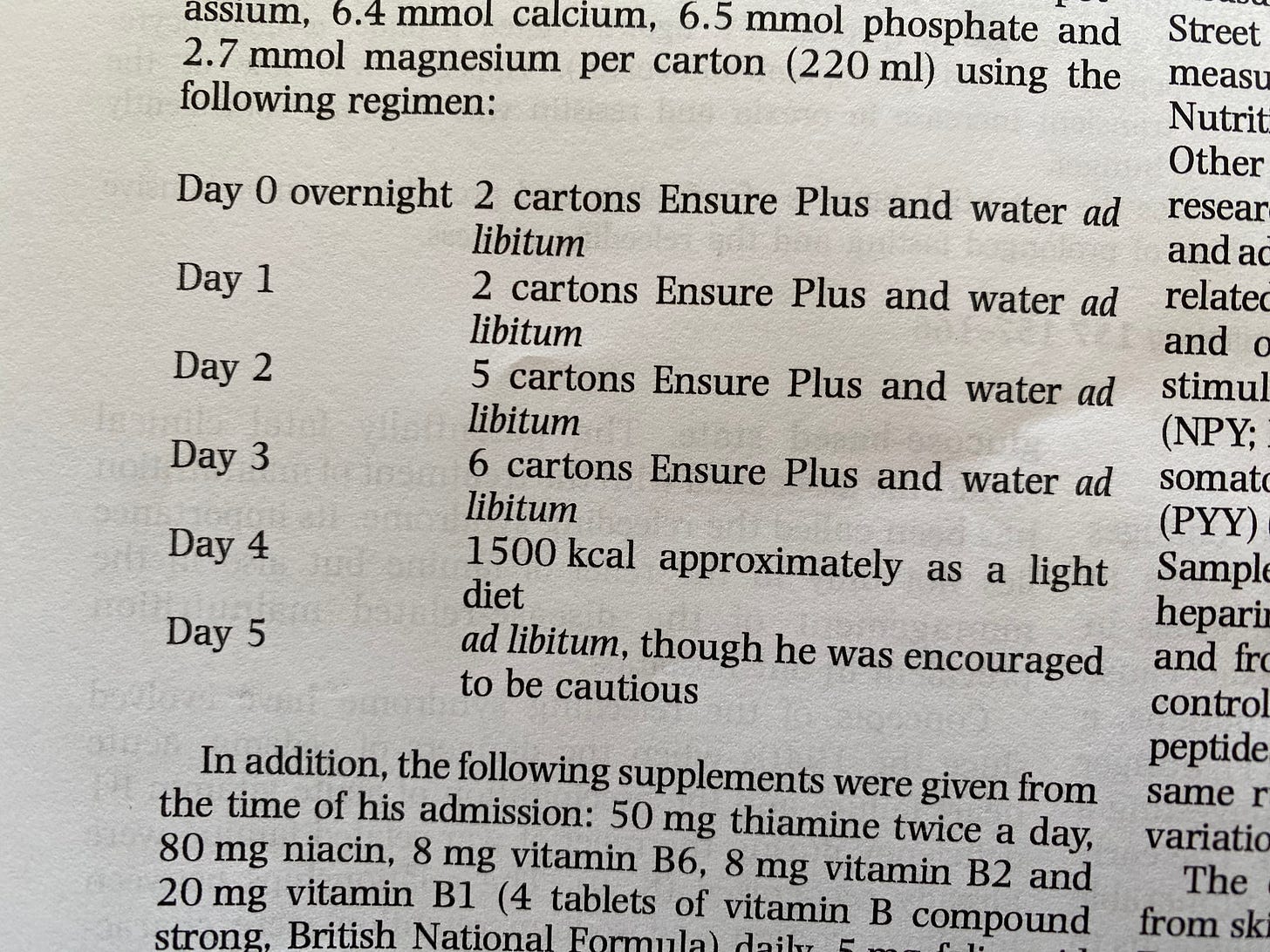 </figure>
</figure>Unfortunately for David Blaine, this fake liquid food was the only thing David Blaine was given for the first 3 days of his refeeding. They explain in the discussion section:
As refeeding raises plasma insulin, potassium, phosphate and magnesium are driven intracellularly, and sodium extracellularly, expanding circulating volume and causing haemodilution, as indicated in David Blaine by changes in his haematocrit and albumin levels. The plasma expansion during the early refeeding period, which can precipitate heart failure, emphasizes the clinical need for sodium restriction and the potential dangers of i.v. saline…<figure>
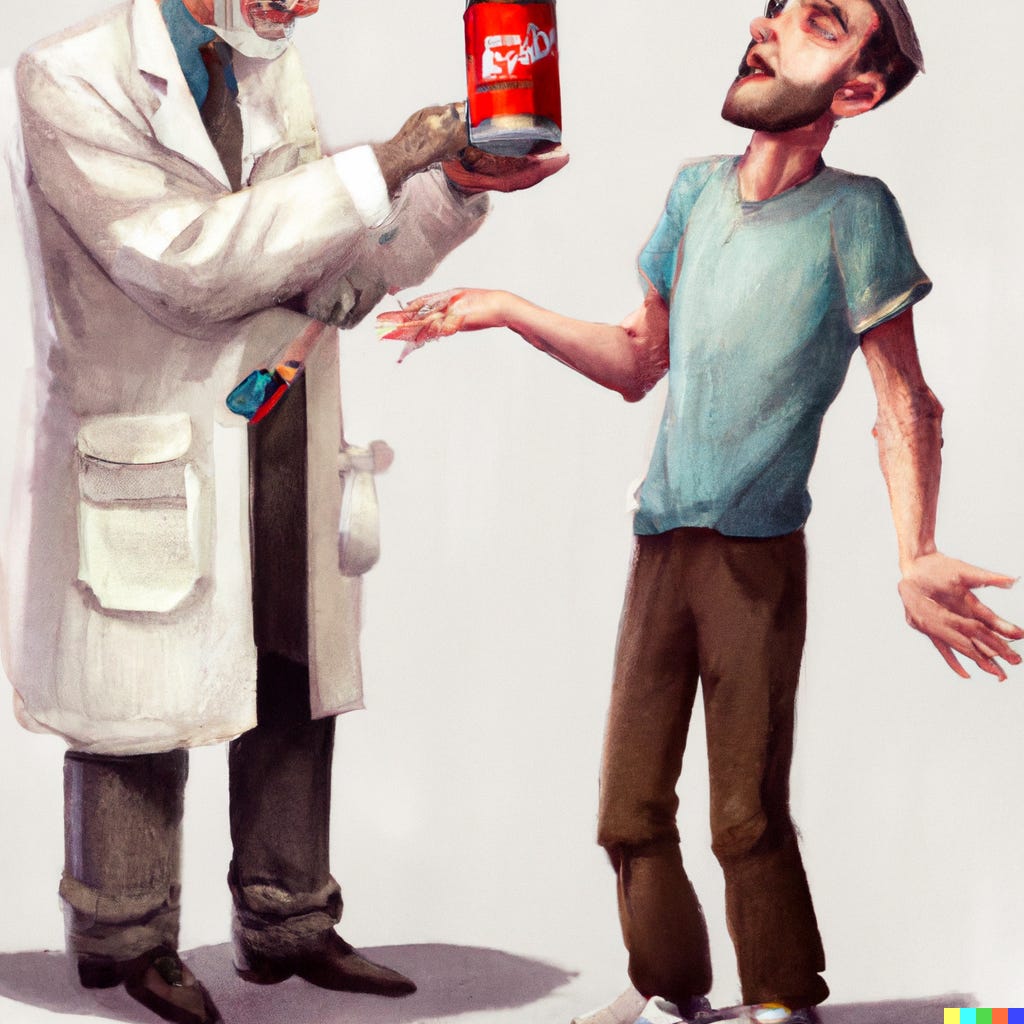 </figure>
</figure>To break that down a bit, they’re saying that the insulin raise from refeeding moves electrolytes in and out of the cell, raising the fluid content of the blood and lowering the concentration of red blood cells (haemodilution). Increasing the blood’s liquid volume can cause heart failure. They say reducing sodium is a good idea so you don’t reduce the blood volume further… but why not also recommend to refeed in a way that doesn’t elicit a big rise in insulin? Carbohydrates are well known to induce a much bigger insulin rise than fat or protein, so again, why did they give David Blaine a seed oil shake with more carbs than a can of coke?
Then again, Blaine didn’t make the right decisions for himself either. He apparently woke up and ate a bag of potato chips and a bagel in the middle of the night at some point
<figure> </figure>
</figure>Chubbyemu made a great video about a woman who wound up in the hospital with refeeding syndrome after eating 23 bananas after 7 days of fasting.
Moral of the story: When you break a fast, eat your protein, eat slow, don’t eat too much, and don’t eat too many carbs at once.